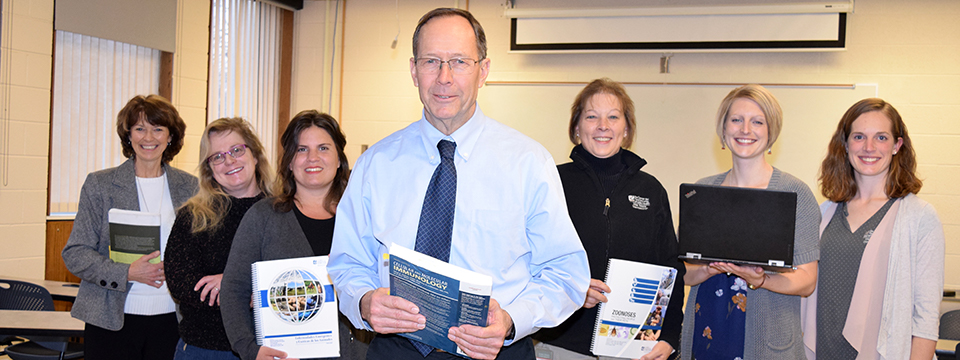
Even as he was agreeing to an interview for this article, Dr. Jim Roth wanted to make sure the story wasn’t solely focused on him.
“I want to be sure to acknowledge the CFSPH team as sharing in this award and acknowledge the partnership of the USDA APHIS Veterinary Services for all they do to support our educational outreach activities,” Roth wrote.
Roth says any accolades he has received in recent years is a total team effort between the folks at the Center for Food Security and Public Health (CFSPH) and the Institute for International Cooperation in Animal Biologics (IICAB), both of which he directed for the past several years.
Accolades he has received – plenty of them.
His most recent award is the 2018 Association of American Veterinary Medical Colleges (AAVMC) Senator John Melcher, DVM Leadership in Public Policy Award. The award is given for leadership in public policy which advances veterinary medical education and for advocating for veterinary medical education on a national and international scale. It is named for former Montana U.S. Senator John Melcher, a 1950 Iowa State veterinary medicine graduate who served two terms in the U.S. Senate.
The Melcher Award is on top of Roth’s election last year into the National Academy of Medicine, becoming the first faculty member from Iowa State’s College of Veterinary Medicine with that distinction. Roth was also recently named the Presidential Chair in Veterinary Microbiology and Preventive Medicine.
While honors keep piling up for Roth, he is quick to share the glory.
“If it was just what I’ve accomplished, I wouldn’t be getting these awards,” he said. “They (CFSPH and ICAB staff members) do the work and make me and the whole university look really good.”
CFSPH came into existence after 9/11 as the nation sought to develop strategies to deal with the potential of agro-terrorism and other threats to livestock production and the U.S. food supply. Since then, the center’s mission has shifted more to responding to exotic and foreign diseases, playing an instrumental role in working with USDA, state animal health officials and industry to revise plans on how to deal with devastating animal disease outbreaks through development of secure food supply plans.
The center received funding from USDA to develop a course on emerging and exotic diseases of animals now available to every veterinary college in the country. The center also received USDA funding to develop and deliver required continuing education for 60,000 USDA-accredited veterinarians in the U.S. Much of the center’s work has implications for human health, especially recognition and prevention of zoonotic diseases that transfer from animals to people.
Roth and his team are currently working with the World Organization for Animal Health to develop online training for individuals tasked with reporting animal disease outbreaks in their country, resulting in an even greater international reach and global understanding of animal health.
CFSPH was created with no Iowa State funds and has continued to be funded almost exclusively through federal, state and private grants. It has grown from three employees to 26 staff members including 14 veterinarians, IT personnel and graphic designers.
“In order to effectively deliver the courses, we need a whole team to make it work,” Roth said. “Our entire staff is dedicated to improve education on topics related to animal diseases, public health and regulatory veterinary medicine.
“The USDA Animal and Plant Health Inspection Service – Veterinary Services has supported and been a partner in our work on the development and delivery of educational materials that are of importance to and appreciated by U.S. veterinarians,” he continued.
Roth’s journey into policy and providing educational materials is a second career of sorts for him. After spending most of his professional life at Iowa State (he joined the CVM faculty in 1977) focusing on research, he officially shut his lab down last year.
“I didn’t have the time to commit to a research lab with my other duties,” he said. “I don’t like to give career advice, but if I did it would be individuals have to evolve professionally over their careers. The science funding opportunities and needs of the profession change rapidly, so you have to change your career focus to stay on top of everything.”
These days Roth is focused on the training and information CFSPH and IICAB provide.
“There was a need nationally for this type of information that no one else was providing,” Roth said. “We are continuing to expand, particularly internationally.
“I have a remarkable staff – anyone who has worked with them will tell you that. It has taken a team to accomplish what we have.”
January 2018
